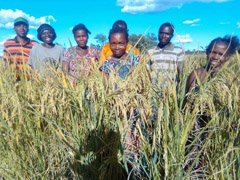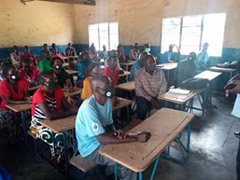MOReDeP Project Activity 2 - Extension through Rice Cluster Approach (2022-01-11)
The purpose of the Market Oriented Rice Development project (MOReDeP) is to increase farmers' income through promoting rice production in Zambia. MOReDeP has been conducting a number of activities towards this end, and this article introduces the second pillar of the project, "Extension through the Rice Cluster Approach".
The last article introduced an activity: "researching and developing rice cultivation techniques that are flexible and favorable to the various ecologies in Zambia" to improve the productivity of rice production in Zambia. Although the developed techniques are essential, they would be meaningless unless practiced by farmers. Also, to increase rice production in Zambia, it is crucial not only to improve the productivity but also increase the number of rice farmers (and enhance the rice cultivation area). For those reasons, MOReDeP in cooperation with the Ministry of Agriculture (MoA) has been conducting extension activities, including carrying out technical training sessions for farmers to spread the use of the developed technique package, "Good Rice Practice" (GRiP), across existing farmers and those who may start rice cultivation.
MOReDeP adopts the "Rice Cluster Approach" for the extension activities. It is aiming at not only spreading the use of the techniques but also forming new rice production districts - "rice clusters". In the last few years, MOReDeP has conducted various surveys to analyze and extract factors of the formation of the existing rice clusters so as to gain further insights to be utilized for the formation of new rice clusters. As a result, the factors of the formation of existing clusters in Zambia were only environmental (access to water, road and rice mills). In keeping with the results from other surveys, the project established hypotheses, including: 1) farmers' joint activities, including information sharing and cooperative marketing/shipping, are effective to improve their techniques and raise the selling prices of rice, and 2) it is important to foster the MoA's extension officers who support farmers. Activities based on such hypotheses are being conducted according to the situation of each cluster to supplements the extension activities of the techniques.. A rice cluster does not just simply mean a group of rice farmers, but it refers to an economic block formed around rice.
Therefore, MOReDeP surveys rice mills and buyers/middlemen to study their needs and the trade terms, shares the attained information with farmers and the MoA's officers, as well as utilizes the data to prepare technical training sessions for farmers. It is critical to better understand the whole value chains and picture ideal rice clusters so that everyone involved in the rice industry benefits from and advances towards their successful formation and enhancement.

Rice farmers from Katuta camp, Mwense district, Luapula province

Technical training sessions for farmers
